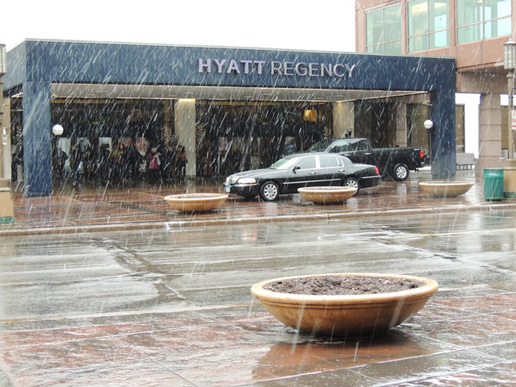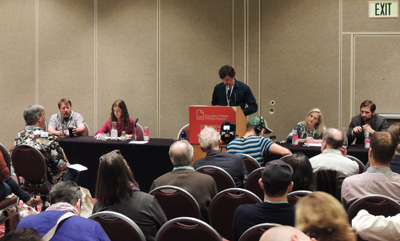 It snowed briefly over two days at the AWP Conference. Most members were inside at panels. It snowed briefly over two days at the AWP Conference. Most members were inside at panels. Now that I’m back in Los Angeles from Minneapolis, I can consider more of what I’d taken in. Among over 180 panels offered at the AWP Writers Conference on the first day, I managed to make it to four. Three had to do with trauma and war. It’s not coincidental. I’m writing a novel based in the Iraq War, 2007. On another day, I made it to another panel on war writing, missing two others. What amazes me is that the subject is popular. Then again, we live with war all the time. It’s bound to affect writers. The first panel, “Mining the Gap: Trauma, Memory, and Reimagined Pasts,” featured five authors, Elizabeth Kadetsky, Elyssa East, Jessica Handler, Denise Grollmus, and Rebecca McClanahan, discussing how trauma changes human beings. As the conference schedule described it, “Grief, trauma, and nostalgia can reshape our memories, erasing fragments or creating insistent, nonlinear repetitions.” Not only were the authors all women, but so was most of the audience of a few hundred. When a panelist pointed that out, everyone looked around, and many eyes fell on me as if, What made this guy come? My smile said, Isn’t trauma gender neutral? As Kadetsky then ventured, “Women tend to talk about their feelings more. Women traditionally are the nurturers.” Perhaps so. When I taught “Vietnam Through Literature” at CalArts in the 90’s, the course filled quickly. Many of the students’ fathers had served in Vietnam, and the fathers had never talked about the war. These students wanted to know about their dads at war. Later at AWP, I learned that one-in-three women in the armed services are sexually assaulted. (I found a VA study confirming this.) That could be another reason why more women than men were there. As I learned elsewhere later that day, VA hospitals have a whole unit devoted to women—and men—who have been sexually assaulted while defending their country. The second panel I attended, appropriately, was “Women Writing War,” with Emily Tedrowe, Jehanne Dubrow, Katey Schultz, and Andria Williams. This panel considered the feminine imagination vs. male imagination. One way they did that was read from their work and let the work speak for itself. I fell into their stories, admiring how they pulled me into the moment. One of Katey Shultz’s short stories from Flashes of War, flash fiction based in Afghanistan during war, featured a scene where “bullets rained like a Carolina downpour.” Many of her comparisons grabbed me. Here, as later with the other panels, writers also had to confront “credentials and authority.” Did one have to experience war to write about war? Andria Williams, author of the upcoming novel The Longest Night from Random House, has been a military spouse, and writes vividly from that point of view. Katey Schultz is not a veteran, yet her stories dive into Afghanistan and often into battle. She did so through meticulous research and, as she says, “through observation, empathy, and imagination. The truth is driven by emotion and not fact. I try to avoid stereotype whenever possible.” As poet and memoirist Brian Turner said in the next panel, “Writing in Response to War,” “It’s easy to capture facts. It’s harder to get to the truth.” In this third panel, Turner, an Iraq War vet, joined poet and Vietnam vet John Balaban to go over certain truths. As Turner said, “I was scared shitless most of the time there.” Most of the time nothing happened, punctuated with moments or minutes of shooting and explosions. His collection of poetry, Here, Bullet, opens with this short piece: The word for love, habib, is written from right to left, starting where we would end it and ending where we might begin Where we would end a war another might take as a beginning, or as an echo of history, recited again. They each read from their published work. Turner read from My Life as a Foreign Country, and one could grasp how his poet’s soul used prose to best advantage. The moment a U.S. Army boot hits the door of an Iraqi house so the soldiers could question the family inside for information, one feels for the members of the family as well as the naïve young men of the Army, trying to be friendly in their high-tech gear. A student at Harvard at the start of the Vietnam War, John Balaban read from his memoir, Remembering Heaven’s Face: A Story of Rescue in Wartime Vietnam. He had voluntarily enlisted, but as a conscientious objector, having grown up Quaker. He often worked in hospitals in Vietnam, sometimes overseeing burned and injured children from the war. As Turner and Balaban each read vivid passages, I couldn’t help but think that war betrayed how utterly cruel people can be. A tsunami of horror sweeps over soldiers and citizens. How can one possibly absorb it? PTSD is as common as eggs. As Balaban read a passage about a child on an operating table and how deeply injured the boy was, I squirmed. His voice cracked, and he was near tears. This is after perhaps forty-five years from the event, and it still chokes him up. Balaban said his goal was, “I want you to know the worst and still find good.” This is exactly where I’m at in my novel, seeking a sense of contradiction as I’m working with my friend and Iraq war veteran Samuel Gonzalez, Jr, who was in the military police in Iraq. Half of his platoon were women. They were fighting on the front line. A woman was often Gonzalez's gunner. The notion that women aren’t fighting is wrong, and I’m most curious about the mixing of men and women soldiers during combat. Is it different than an all-male Army? Might my protagonist fall in love in war? On Saturday, I attended, “Telling Our New War Stories,” again with Turner and Schultz, joined by Benjamin Busch, Phil Klay, and Siobhan Fallon. Turner spoke of the difficulty of trying to understand what he experienced. He felt that a war novel shouldn’t end crisply with understanding but with a sense of layers of meaning and confusion. “We can learn things when we get to a dead end.” Siobhan Fallon writes short fiction to understand things. For her collection You Know When the Men are Gone, she related how she and her husband, living in Ft. Benning, Georgia, were giving a cocktail party when the neighbors next door began to argue loudly. “It’s a good image for military life,” she said, “in housing projects with thin walls.” Phil Klay, too, writes fiction. He was writing a novel and short stories at the same time and discovered that, “The stories allowed me to go in at different angles. I wanted a bunch of voices who didn’t necessarily agree with each other." He abandoned the novel and created the collection Redeployment, which takes place in both Iraq and Afghanistan. Turner said while in Iraq, he was writing diaries, then later, poems. As he said, “Why share them? War is part of our culture. The word ‘complicity’ is one of my driving words, something difficult to live with. Maybe that’s some small way to be a part of the conversation.” Klay added, “When I came back from Iraq, I was asking what the hell was that?” People back home seemed to talk about the war in a way that was so odd, he said. “Something was missing. What was it? I tried to figure it out. I didn’t have the notion of writing a work of art. It was about writing to say something. It’s a letter to you. You should respond.” Moderator Benjamin Busch, author of the memoir Dust to Dust, ended in saying in writing about war, we have to avoid the expected tropes. “It seems people want to see the worst shit, but there were fun times, funny times, too—and beauty.” There has to be more beyond the battles—perhaps the healing.
5 Comments
4/14/2015 08:08:55 am
Hi, Christopher! It was great to read your take on these panels. War *is* a popular topic in literature right now, but there's plenty of room for more voices. I'm eager to hear more about your novel!
Reply
Christopher Meeks
4/14/2015 12:04:56 pm
Andria, thanks. You were fabulous on the panel. I understand you replaced someone, so it was great you could do that. May your upcoming book do well.
Reply
As a Marine Corps veteran and writer, I attended both war writing panels to see what I could learn about how to handle my own work. I was disappointed to see that no female veteran writers were on the Women Writing War panel, and validated in that disappointment when some of the first questions were asked by women in attendance who had served. What a missed opportunity. I was also disappointed to hear Katey Schultz say to us that in all her research, she had not spoken to any veterans (unless I misunderstood this, but I don't think I did). Veteran communities are plentiful on college campuses and easy to access; you don't just have to go to a VFW or a 4th of July parade. Colleges are filled with veterans like me who would love to help with research, which is no substitute for experience, or even the experience of talking to a veteran about what they've been through. Phil Klay is a former Marine Corps officer, and even he spoke directly to other veterans when researching his National Book Award winning collection. I would encourage Ms. Schultz to reach out to veterans directly in the future if she did not already at AWP last week.
Reply
4/30/2015 08:29:17 am
I'm looking forward to hearing more about your novel based in the Iraq War! Is it going to be another crime thriller or are you branching out again?
Reply
Leave a Reply. |
AuthorBefore I wrote novels and plays, I was a journalist and reviewer (plays and books). I blogged on Red Room for five years before moving here. CategoriesArchives
July 2023
|

 RSS Feed
RSS Feed
